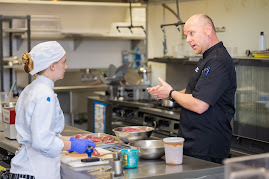Why Study at a Culinary School
Are culinary schools worth it?
Some say that culinary school is unnecessary because cooks can learn “on the job.”And while there are certain lessons that are best taught in
a professional kitchen — like how to work around others on a crowded line, or how
to manage your time during service — there are unique benefits to the classroom
setting that can’t be replicated in a working kitchen.
Here are some ways students may enjoy the culinary school
advantage.
As long as you can complete the tasks assigned to you, your
supervisors may not have the time or incentive to help you expand your culinary
skills. And even if you’ve found a great chef mentor, you still have to
complete your assigned tasks before you can focus on learning.
A culinary student’s job, on the other hand, is to learn as
much as possible. And your Chef Instructor’s job is to teach you. Everyone is
working toward the same goal — providing students with the knowledge and tools
they’ll need to be successful.
This environment lets students ask questions, make mistakes,
and practice until perfect, without holding up service or wasting a
restaurant’s product. That’s what school is all about!
Understand Why, Not Just How
Why do savory dishes benefit from a hint of acidity? Why do
we add eggs to a cake? Without the underlying understanding of these basic
culinary principles, you may find yourself unable to make substitutions and
alterations, hindering your creativity.
In culinary school, Chef Instructors are available
to explain the science behind these techniques, which will become tools in your
experimental toolbox.
Travel the Culinary World
A restaurant or professional kitchen will have a limited
number of menu items, often within one specific type of cuisine. Cooks will
make those same recipes over and over. And while they may gain great expertise
in that one culinary style, they won’t have the opportunity to learn different
world cuisines.
But in culinary school, students will have the opportunity
to explore a wider variety of food styles. Culinary Arts programs
include courses on the world or regional cuisines, exposing students to
culinary traditions from around the globe.
Give Your Career a Boost
Culinary school graduates are not chefs. That’s a title they
still must earn.
But a culinary degree or diploma on your resume may provide
hiring chefs or supervisors with proof that you take your career seriously. And
that could be the difference between winning the interview or being passed over
for a more experienced candidate.




Comments
Post a Comment